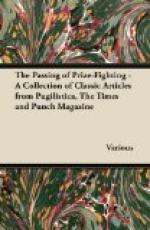Culch. (on a seat commanding a panorama of roofs, gables, turrets, and spires). Now this is a thing that can only be properly enjoyed when one is by oneself. The mere presence of PODBURY—well, thank goodness, he’s found more congenial company. (He sighs.) That looks, like an English girl sketching on the next seat. Rather a fine profile, so regular—general air of repose about her. Singular, now I think of it, how little repose there is about MAUD. (The Young Lady rises and walks to the parapet.) Dear me, she has left her india-rubber behind her. I really think I ought— (He rescues the india-rubber, which he restores to the owner.) Am I mistaken in supposing that this piece of india-rubber is your property?
The Y.L. (in musically precise tones). Your supposition is perfectly correct. I was under the impression that it would be safe where it was for a few moments; but I am obliged to you, nevertheless. I find india-rubber quite indispensable in sketching.
Culch. I can quite understand that. I—I mean that it reduces the—er—paralysing sense of irrevocability.
The Y.L. You express my own meaning exactly.
[CULCHARD, not being quite
sure of his own, is
proportionately pleased.
Culch. You nave chosen an inspiring scene, rich with historical interest.
The Y.L. (enthusiastically). Yes, indeed. What names rise to one’s mind instinctively MELANCHTHON, JOHN HUSS, KRAFT, and PETER VISCHER, and DUeRER, and WOHLGEMUT, and MAXIMILIAN THE FIRST, and LOUIS OF BAVARIA!
Culch. (who has read up the local history, and does not intend to be beaten at this game). Precisely. And the imperious MARGRAVE OF BRANDENBURG, and WALLENSTEIN; and GUSTAVUS ADOLPHUS, and GOETZ VON BERLICHINGEN. One can almost see their—er—picturesque personalities still haunting the narrow streets as we look down.
The Y.L. I find it impossible to distinguish even the streets from here, I confess, but you probably see with the imagination of an artist. Are you one by any chance?
Culch. Only in words; that is, I record my impressions in a poetic form. A perfect sonnet may render a scene, a mood, a passing thought, more indelibly than the most finished sketch; may it not?
The Y.L. That is quite true; indeed, I occasionally relieve my feelings by the composition of Greek or Latin verses, which I find, on the whole, better adapted to express the subtler emotions. Don’t you agree with me there?
Culch. (who has done no Greek or Latin verse since he left school). Doubtless. But I am hindering your sketch?
The Y.L. No, I was merely saturating my mind with the general effect. I shall not really begin my sketch till to-morrow. I am going now. I hope the genius of the place will inspire you.




